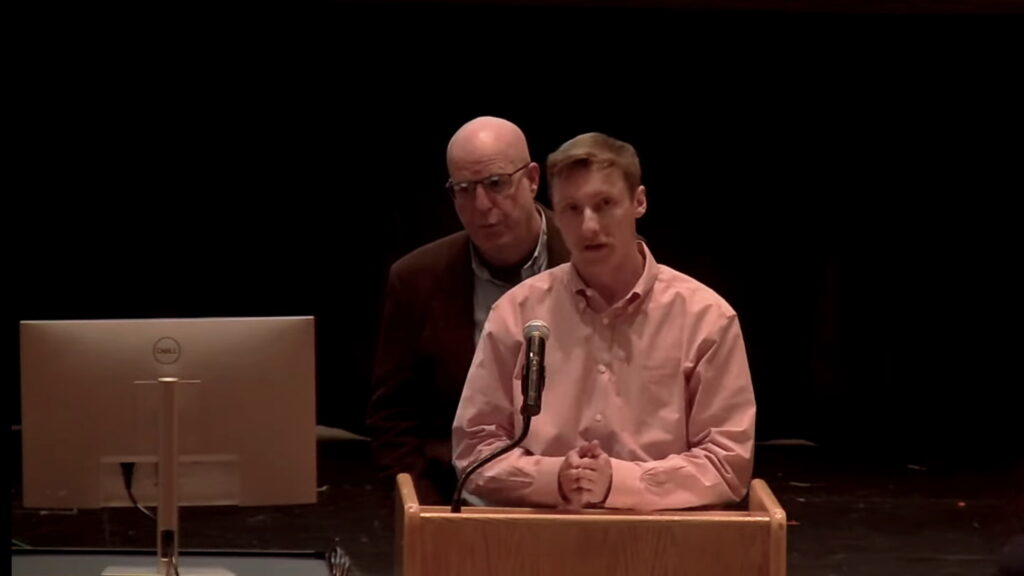
Reading, MA — After more than three and a half hours of debate and two roll-call votes, during which a non-Town Meeting member was called out of order for speaking out of turn and had to be asked to leave the floor, Town Meeting voted 129-32 to approve Article 17 of the warrant on Thursday. This article changes zoning in downtown and in a smaller section of town near the Summit Towers to comply with the state-mandated MBTA Communities law.
Community Planning and Development Commission chair John Weston, along with Director of Development Andrew McNichol, presented two articles for consideration to Town Meeting. The first, Article 16, would have changed lot size requirements and density allowances in the downtown while making similar changes to South Main Street. The article that was accepted makes similar changes to downtown zoning. Weston referred to both plans as “minimal compliance with the law,” stating that either article “gets us to compliance without changing the character of development [in Reading].”

It was also noted that Article 16 would allow for up to 1,575 units in the designated areas, while Article 17 allows for 1,526 units of development. McNichol pointed out when asked that both figures are MBTA Communities compliant and include units that already exist in the affected areas. Moderator Alan Foulds allowed debate to occur on both articles simultaneously.
Debate ranged on various issues, including frustration over state mandates regarding local zoning, as expressed by several Town Meeting members, including Phil Pacino, MaryAnne Downing, and John Sasso, who referred to the MBTA Communities law as “sinister.”
“We know our needs better than state bureaucrats,” Downing exclaimed.
Others, such as John O’Neil, expressed disappointment over the lack of affordability requirements in the law. While David Talbot argued that Article 16 did not change much regarding what is already allowed. Mary Parr asked how many of Reading’s firefighters, police officers, and teachers could afford to live in Reading. With Mary Ellen O’Neil asking Town Meeting members to vote, thinking about future generations, many of whom, she shared, cannot afford to live in Reading. Linda Snow Dockser noted, “All of us benefit from having more affordable units in town.” Melissa Murphy added that neither proposal would adequately address concerns about affordability.
When questioned, McNichol shared that state grants and other perks might be at risk from non-compliance with the law, including a $500,000 grant already awarded. Alicia Williams responded that with the town having $19,000,000 in free cash, as reported on Tuesday night by Town Accountant Sharon Angstrom, that she did not care about the $500,000. Other members, including Mark Dockser, stated that they did care about the $500,000 in grants and reminded the body that it was not just the one grant but others going forward that could be affected. Tara Gregory agreed, stating, “Noncompliance is too expensive.”
Several questions were raised regarding the current litigation between the state and the Town of Milton, which rejected MBTA Communities. John Arena suggested that language could be placed in the articles, rescinding them if Milton succeeded. Town Counsel Ivria Fried cautioned that the state would likely reject any such language in the articles. However, she also noted that Town Meeting could choose to replace any bylaw language that it adopted if the Supreme Judicial Court (SJC) declared the MBTA Communities law as unconstitutional. Kendra Cooper, who shared that she had watched the arguments before and the questions from the SJC on the issue, suggested that SJC’s rejection of the law could be a possible outcome.
Carlo Bacci offered an amendment to change the lot size requirement in the downtown from 6,000 square feet to 5,000 square feet, arguing that it would open up more lots for potential development. This led to Shawn Brant inquiring about the size of Bacci’s downtown lot. Bacci stated that he was unsure but that it is between 5,000 and 6,000 square feet. Alvarado spoke up, declaring that Bacci’s amendment was a blatant attempt to change zoning policy for personal benefit. Weston added that the 6,000 square-foot figure in the proposed bylaw amendment was arrived at based on evidence that, given other restrictions, a three-family unit could not fit on a lot smaller than 6,000 square feet. Town Meeting voted to reject the proposed amendment.
Carla Nazzaro also expressed concern regarding wording that had been added to Article 17 to cover the possible circumstance of both articles being approved by Town Meeting. Nazzaro’s concern was that, in that circumstance, both sets of changes would be accepted and submitted to the state. Nazzaro shared that she would push for a town-wide vote on the issue if that occurs. Fried assured Town Meeting that the language existed only to clear up discrepancies that would occur in the case of both articles being approved. Those potential discrepancies could cause the state to reject the plan.
Debate concluded with Steve Herrick pointing out that MBTA Communities was created to increase development near and around MBTA train stations. He then reminded Town Meeting that the proposal in Article 17 placed many possible units “nowhere near the train station.” David Snow also suggested that the state would be more likely to accept Article 16.
A roll call vote was taken on Article 16, which was rejected 76-85. After that, Article 17 was approved by a roll call vote of 129-32.
Town Meeting adjourned sine die at 11:30 pm despite two potential instructional motions to be heard.
